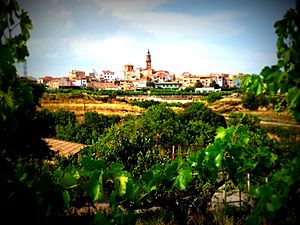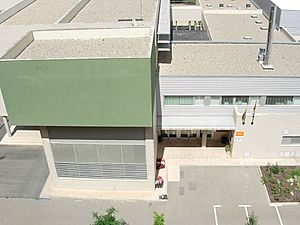Luis Buñuel facts for kids
Quick facts for kids
Luis Buñuel
|
|
|---|---|

Buñuel in 1929
|
|
| Born |
Luis Buñuel Portolés
22 February 1900 Calanda, Aragon, Spain
|
| Died | 29 July 1983 (aged 83) Mexico City, Mexico
|
| Citizenship | |
| Alma mater | University of Madrid |
| Occupation | Filmmaker |
| Years active | 1929–1977 |
|
Notable work
|
Un Chien Andalou, L’Age d’Or, Los Olvidados, Viridiana, El ángel exterminador, Diary of a Chambermaid, Simón del desierto, Belle de Jour, Le Charme discret de la bourgeoisie, Cet obscur objet du désir |
| Spouse(s) |
Jeanne Rucar
(m. 1934) |
| Children | Juan Luis Buñuel (1934–2017) Rafael Buñuel |
| Relatives | Diego Buñuel (grandson) |
Luis Buñuel Portolés (born February 22, 1900 – died July 29, 1983) was a famous Spanish filmmaker. He made movies in France, Mexico, and Spain. Many people think he was one of the greatest and most important filmmakers of all time.
Buñuel often made films that were part of the surrealist movement. This means his movies often had dream-like or strange images. He made films from the 1920s to the 1970s. He worked in both Europe and North America. He also directed films in many different styles.
Even with all the different styles, his films were always easy to recognize. Filmmaker Ingmar Bergman once said, "Buñuel nearly always made Buñuel films." This shows how unique his style was.
Many of Buñuel's films are considered classics. Seven of his movies are on Sight & Sound magazine's list of the top 250 films ever. He also has 15 films on the They Shoot Pictures, Don't They? list of the 1,000 greatest films. This puts him second only to Jean-Luc Godard.
When Buñuel passed away at age 83, The New York Times newspaper called him a "leader of avant-garde surrealism." They also said he was a major international movie director for half a century.
In 1982, Buñuel wrote his autobiography, Mon Dernier Soupir (My Last Sigh). In this book, he shared stories about his life, friends, and family. He also talked about his unique personality. He wrote about his dreams and meeting famous artists like Pablo Picasso and Charlie Chaplin.
Buñuel died in Mexico City in 1983. His wife, Jeanne, said he died from problems related to diabetes. His funeral was very private, with only family and close friends attending.
Contents
Early Life and Education
Luis Buñuel was born on February 22, 1900, in Calanda. This was a small town in the Aragon region of Spain. His father, Leonardo Buñuel, had made a lot of money in a hardware business in Havana, Cuba. He returned home to Calanda and married María Portolés Cerezuela. Luis was the oldest of seven children.
When Luis was just a baby, his family moved to Zaragoza. They were one of the richest families there. In Zaragoza, Buñuel went to a strict private school run by the Jesuits. He started at age seven and stayed for seven years. Even as a child, he loved putting on shows. Friends said he would project shadows on a bedsheet using a magic lantern. He was also good at boxing and playing the violin.
In 1917, he went to the University of Madrid. He first studied farming, then engineering, and finally switched to philosophy. He became very close friends with painter Salvador Dalí and poet Federico García Lorca. They were part of a group of important Spanish artists called "La Generación del 27." This group was known for its unique, new art style.
Buñuel loved movies even more after seeing Fritz Lang's film Der müde Tod. He said he felt completely changed after watching it. He decided then that movies would be his way of expressing himself.
Filmmaking Style
Buñuel's way of making films was very special. He focused on how scenes were set up, the sounds, and the music. He was also very efficient. He would shoot films in just a few weeks. He rarely changed his script and filmed as much as possible to save time later.
He believed that the whole film, from the images to the timing, was first created in the filmmaker's mind. Because of this, he was compared to Alfred Hitchcock. Both directors were known for being very precise and planning everything ahead of time. Actress Jeanne Moreau said Buñuel never wasted a shot. She explained that he had the whole film in his mind before he even started filming.
Family Life
In 1926, Luis Buñuel met Jeanne Rucar Lefebvre. She was a gymnastics teacher and had won a bronze medal at the 1924 Paris Olympics. They got married in 1934. They stayed married throughout his life and had two sons, Juan Luis and Rafael. Their grandson, Diego Buñuel, is also a filmmaker. He hosts the Don't Tell My Mother series on the National Geographic Channel.
Honoring Luis Buñuel
Many places and events have honored Luis Buñuel:
- In 1994, a special show of his films was held in Bonn, Germany. It celebrated him as one of the most respected filmmakers in the world.
- A secondary school in Zaragoza, Spain, is named after him: Instituto de Educación Secundaria Ies Luis Buñuel.
- There is also a Spanish international school in France called Liceo Español Luis Buñuel.
- In his hometown of Calanda, Spain, there is a museum called the Centro Buñuel Calanda (CBC). It has a bust of his head and is dedicated to his work.
- One of the main theaters at the Palais des Festivals et des Congrès in Cannes, France, is named Salle Buñuel. This is where the famous Cannes Film Festival is held.
- In 2000, for the 100th anniversary of his birth, the Cannes festival honored him. They opened the new Luis Buñuel room and had a special exhibition about his work.
- The Luis Buñuel Film Institute (LBFI) in Los Angeles works to promote his films and research his life.
Awards and Recognition
Buñuel received many awards for his work:
- In 1982, he was given the Career Golden Lion at the Venice Film Festival. This is a very high honor for a filmmaker's entire career.
- He also received an Honorable Mention from the FIPRESCI Prize in 1969.
- In 1977, he won the National Prize for Arts and Sciences for Fine Arts in Mexico.
- At the 11th Moscow International Film Festival in 1979, he received an Honorable Prize for his contributions to cinema.
- He was even nominated for the Nobel Prize in Literature in 1968.
See also
 In Spanish: Luis Buñuel para niños
In Spanish: Luis Buñuel para niños
- Art film
- Cinema of Mexico
- Cinema of Spain
- Experimental film
- Generation of '27
- List of atheists in film, radio, television and theater
- List of banned films
- Satire
- Surrealism
- Surrealist cinema



